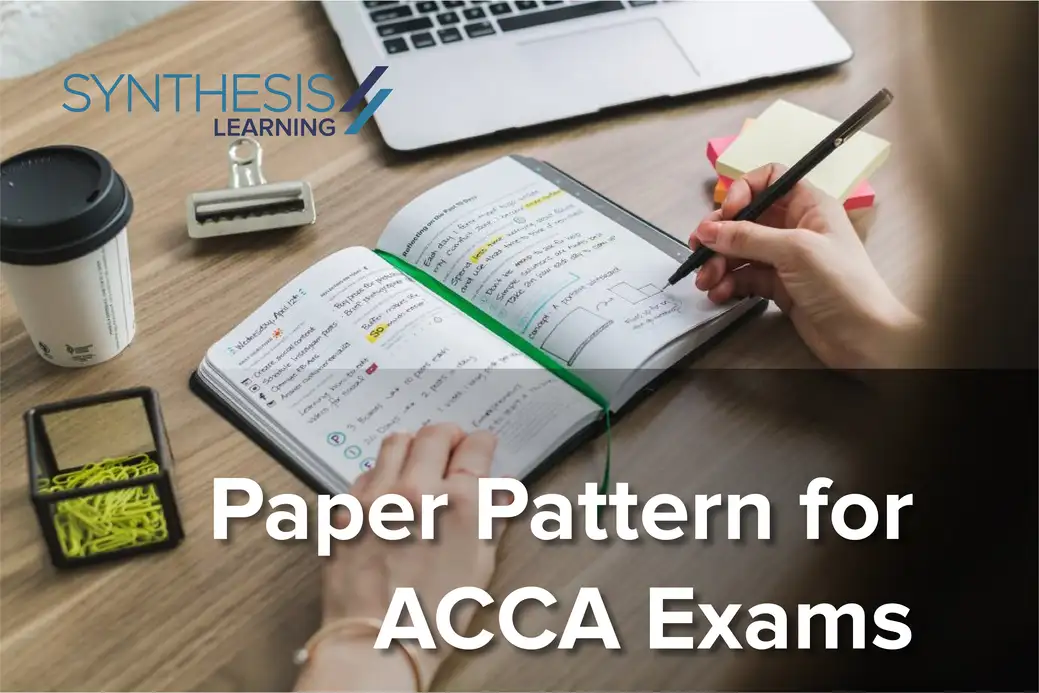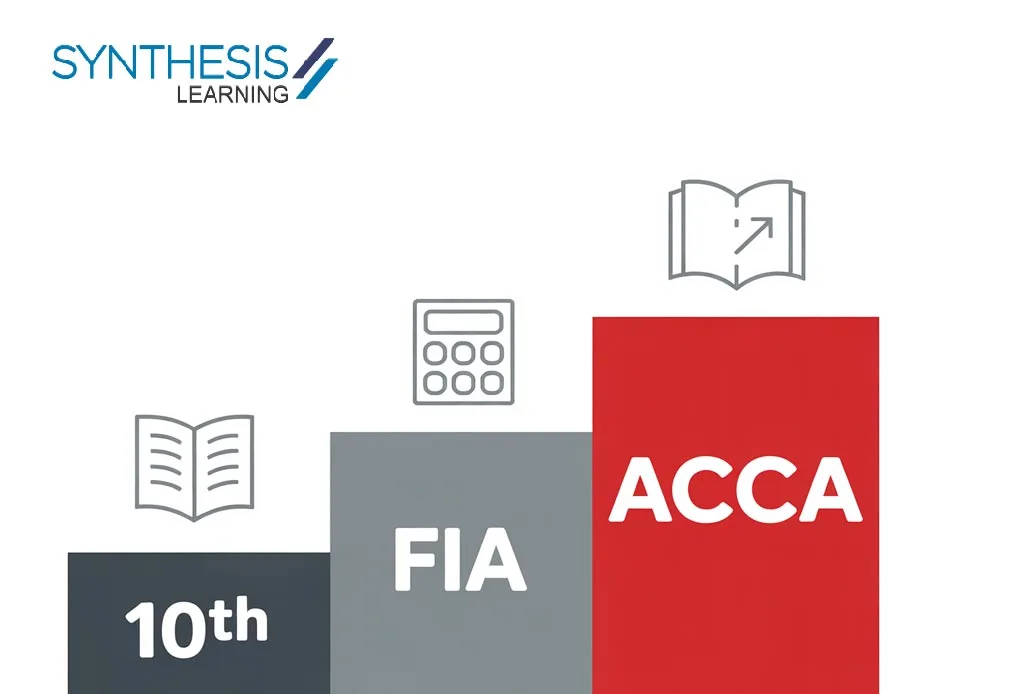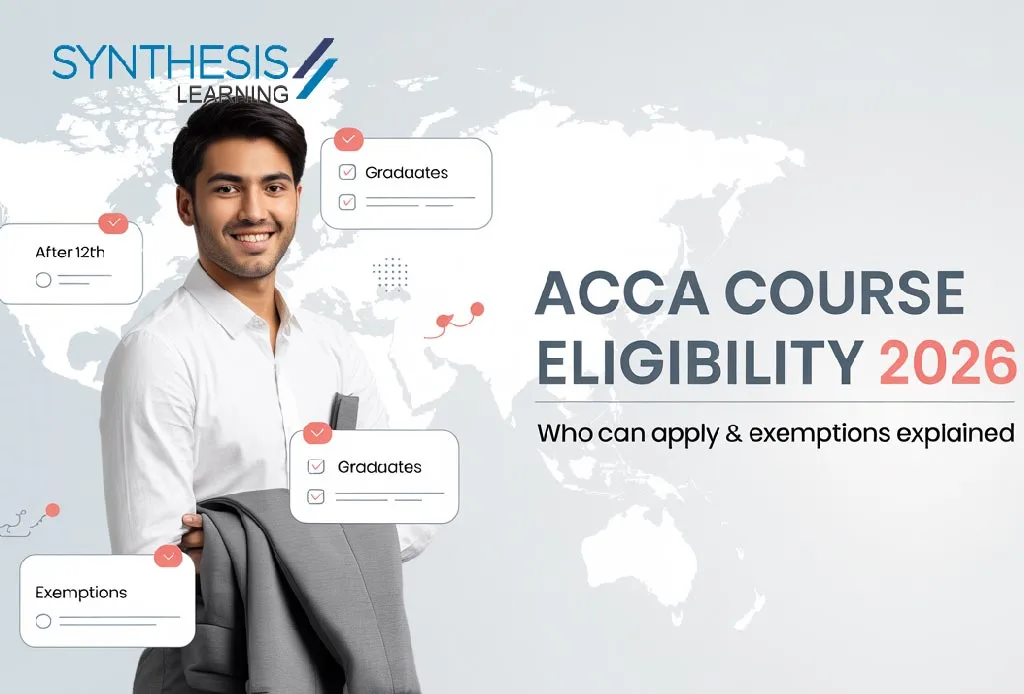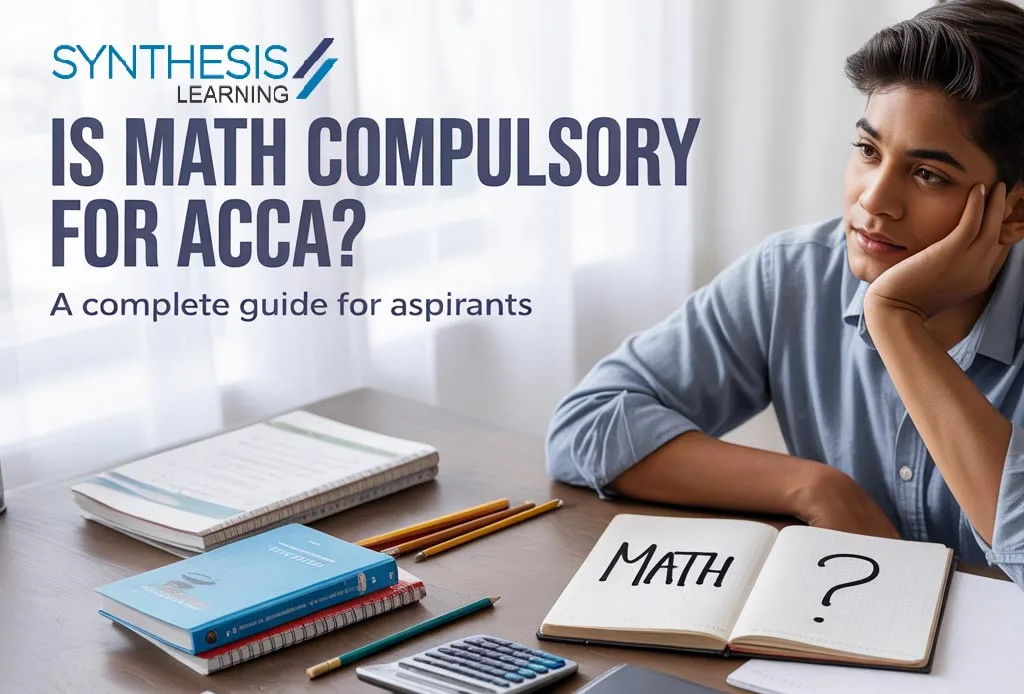Table of Content
Choosing to pursue the Association of Chartered Certified Accountants qualification is a decisive step toward a global finance career. Recognised across industries and countries, the ACCA qualification equips professionals with technical competence, ethical grounding, and strategic insight. However, the complexity of the syllabus and assessment structure can feel overwhelming at the outset. A clear understanding of the ACCA exam pattern is therefore essential before beginning this journey.
The ACCA curriculum consists of 13 papers, often referred to as the ACCA total papers, divided across three progressive levels. Each level builds on the previous one, ensuring structured professional development. This guide explains the complete ACCA exam structure, paper pattern, and assessment approach in detail. By understanding how each paper is examined, candidates can plan their studies more effectively and progress with confidence.
How Is the ACCA Qualification Structured?
The ACCA qualification follows a carefully designed three level structure that mirrors professional growth in the finance domain. Each level focuses on a distinct learning outcome, ranging from foundational understanding to advanced strategic leadership. This structure ensures that candidates develop both theoretical knowledge and practical decision making skills. Progression through the levels reflects increasing complexity and responsibility.
The qualification is divided into the following levels:
- Applied Knowledge
- Applied Skills
- Strategic Professional
Candidates must complete each level sequentially, which ensures a strong academic and professional foundation before advancing to higher level strategic papers.
Applied Knowledge Level:
The Applied Knowledge level serves as the entry point into the ACCA qualification. It focuses on introducing candidates to the essential concepts of business, accounting, and finance. At this stage, students develop an understanding of how organisations function, how financial data is recorded, and how management decisions are supported. This level prioritises conceptual clarity and accuracy over advanced application.
The objective of this level is to ensure that candidates possess a solid base before progressing to more technical subjects. The exams are designed to test knowledge recall, basic interpretation, and fundamental application. Since these papers form the backbone of the entire qualification, strong performance here significantly supports future success.
Objective:
Develop core knowledge and understanding.
Papers (All Mandatory):
- Business and Technology (BT), which introduces organisational structure, governance, and ethics
- Management Accounting (MA), which focuses on cost control and decision making
- Financial Accounting (FA), which builds foundational financial reporting skills
Exam Features:
- Computer based, on demand examinations
- Entirely objective format
- Suitable for flexible scheduling and early progression
Applied Skills Level:
The Applied Skills level represents a significant step up in both difficulty and professional relevance. At this stage, candidates are required to apply technical knowledge to realistic business and financial scenarios. The focus shifts from learning concepts to analysing data, applying standards, and making informed judgements. This level prepares students for real world professional responsibilities.
Each paper within this level builds specific competencies required by finance professionals. Time management, analytical thinking, and structured responses become increasingly important. Performance at this level often determines a candidate’s readiness for senior level responsibilities in accounting and finance roles.
Objective:
Apply technical skills to complex scenarios.
Papers (All Mandatory):
- Corporate and Business Law (LW)
- Performance Management (PM)
- Taxation (TX)
- Financial Reporting (FR)
- Audit and Assurance (AA)
- Financial Management (FM)
Exam Features:
- Combination of objective testing and written analysis
- Increased emphasis on interpretation and professional judgement
- Majority of exams conducted in quarterly sessions
Strategic Professional Level:
The Strategic Professional level is the final and most advanced stage of the ACCA qualification. It focuses on developing leadership capability, strategic thinking, and ethical decision making. Candidates are expected to evaluate complex business scenarios and communicate their recommendations clearly and professionally. This level mirrors the challenges faced by senior finance leaders.
In addition to mandatory papers, candidates can choose optional subjects aligned with their career aspirations. This flexibility allows specialisation in areas such as taxation, audit, or financial management. Success at this level demonstrates readiness for executive and advisory roles.
Objective:
Develop strategic vision and professional leadership.
Papers:
Essentials (Mandatory):
- Strategic Business Leader (SBL)
- Strategic Business Reporting (SBR)
Options (Choose Any Two):
- Advanced Financial Management (AFM)
- Advanced Performance Management (APM)
- Advanced Taxation (ATX)
- Advanced Audit and Assurance (AAA)
How Does the ACCA Exam Pattern Change by Level?
The ACCA exam pattern evolves as candidates progress through the qualification. Early levels emphasise objective assessment to test conceptual understanding. As candidates move forward, exams increasingly focus on written analysis, professional judgement, and strategic evaluation. This progression ensures that assessment methods reflect real world professional expectations.
Despite differences in format and complexity, the core assessment principle remains consistent. Every ACCA paper requires a minimum pass mark of 50 percent. Understanding how exam formats change helps candidates adjust their study strategies accordingly.
Applied Knowledge Level Exam Pattern
At the Applied Knowledge level, all exams are computer based and fully objective. Questions are structured to assess accuracy, speed, and clarity of understanding. The on demand format allows candidates to attempt exams when they feel prepared, providing flexibility and convenience.
These exams are ideal for students transitioning from academic study to professional qualifications. Regular practice with objective questions helps build confidence and exam familiarity. Strong performance at this stage sets a positive tone for the rest of the ACCA journey.
Format:
100 percent objective testing using multiple choice and multi task questions.
Duration:
2 hours per paper.
Paper | Section A | Section B |
BT | 46 OTQs (76 marks) | 6 MTQs (24 marks) |
MA | 35 OTQs, 2 marks each (70 marks) | 3 MTQs, 10 marks each (30 marks) |
FA | 35 OTQs, 2 marks each (70 marks) | 2 MTQs, 15 marks each (30 marks) |
Applied Skills Level Exam Pattern Explained
The Applied Skills exams introduce longer durations and more detailed responses. While Corporate and Business Law remains fully objective, other papers require candidates to write structured answers based on scenarios. These exams assess not only technical knowledge but also clarity of explanation and application.
Candidates must learn how to manage time effectively across multiple sections. Practising past exam questions becomes critical at this stage. A disciplined study plan is essential to handle the increased workload and complexity.
Formats:
- LW: Fully objective, on demand, 2 hours
- PM, TX, FR, AA, FM: Mixed objective and written exams, conducted quarterly, 3 hours
Paper | Section A | Section B | Section C |
LW | 45 OTQs (70 marks) | 5 OTQs (30 marks) | — |
PM, FR, FM | 15 OTQs (30 marks) | 3 Case Studies (30 marks) | 2 Written Questions, 20 marks each (40 marks) |
TX | 15 OTQs (30 marks) | 3 Case Studies (30 marks) | 3 Written Questions (10, 15, 15 marks) |
AA | 3 Case Studies (30 marks) | — | 3 Written Questions (30, 20, 20 marks) |
Strategic Professional Level Exam Pattern
Strategic Professional exams are fully written and case study based. Candidates must demonstrate strategic insight, ethical awareness, and professional communication skills. Answers are evaluated on relevance, structure, and clarity, not just technical accuracy.
The introduction of pre seen material for SBL allows candidates to prepare in advance. However, the exam still tests adaptability and real time decision making. Thorough preparation and exam technique are critical at this level.
Format:
100 percent written and case study based.
Duration:
3 hours.
Key Update:
From September 2023, SBL pre-seen case material will be released two weeks before the exam.
Paper | Section A | Section B |
SBL | One integrated case study with three tasks (100 marks total, including 20 professional skills marks) | — |
SBR | Question 1: 30 marks; Question 2: 20 marks | Two questions, 25 marks each |
AFM, APM, AAA, ATX | One compulsory case study (50 marks) | Two questions, 25 marks each |
Key Logistics: Exam Timing, Fees and Duration
Understanding exam logistics is crucial for effective planning. Exam frequency, booking deadlines, and fees vary across levels. Missing deadlines can result in delayed progression and additional costs. Early planning helps candidates manage both time and finances efficiently.
Level | Exam Frequency | Booking Deadline (Typical) | Fee per Paper (Approx.) |
Knowledge | On demand | 4 to 5 days in advance | £100 |
Skills (LW) | On demand | 4 to 5 days in advance | £100 |
Skills (PM, TX, etc.) | March, June, September, December | Last day of Jan, Apr, Jul, Oct | £135 |
Professional | March, June, September, December | Last day of Jan, Apr, Jul, Oct | SBL £238; Others £170 |
A dedicated student can complete all ACCA total papers within approximately 1.5 to 3 years. The timeline depends on exemptions, study mode, and exam planning.
ACCA Excellence with a Platinum Approved Learning Partner
Success in ACCA depends not only on effort but also on structured academic support. A Platinum Approved Learning Partner provides proven teaching quality and strong student outcomes. This level of accreditation reflects consistent excellence in delivery and results.
Synthesis Learning supports students throughout their ACCA journey with a comprehensive academic and professional framework. From expert teaching to career guidance, students receive end-to-end support.
Why Synthesis Learning stands out:
- Consistently high pass rates exceeding global averages
- Platinum Approved Learning Partner status, the highest ACCA recognition
- Faculty comprising ACCA, CA, and CIMA qualified professionals
- Dedicated internship, ACCA online classes and placement support
- Substantial cost savings through registration and exemption discounts
- Affordable coaching that allows recovery of costs before completion
Conclusion: Your Strategic Path to ACCA Membership
The ACCA qualification is a structured progression from foundational knowledge to strategic leadership. Each level builds essential skills required for global finance roles. Understanding the ACCA exam pattern allows candidates to plan effectively and avoid unnecessary challenges. With the right preparation strategy and professional guidance, achieving ACCA membership becomes a realistic and rewarding milestone.
To continue building your understanding of the ACCA qualification, refer to our other blogs that address key academic and professional aspects of ACCA studies.
FAQ’s
1. How many papers are in ACCA?
The ACCA qualification consists of 13 papers in total. These are divided across Applied Knowledge, Applied Skills, and Strategic Professional levels.
2. What is the ACCA exam pattern?
The exam pattern changes by level. Applied Knowledge exams are fully objective, Applied Skills exams combine objective and written formats, and Strategic Professional exams are entirely case study based.
3. How long does it take to complete all ACCA papers?
Most students complete the qualification within 2.5 to 3 years. With focused full time study, it can be completed in approximately 1.5 years.
4. What is the pass mark for every ACCA paper?
Each ACCA paper has a uniform pass mark of 50 percent.
5. Can I choose the order of ACCA papers?
You may attempt papers in any order within the same level. However, lower levels must be completed before progressing to the Strategic Professional level.
6. What is the best way to prepare for ACCA exams?
Effective preparation includes syllabus mastery, consistent exam practice, and structured guidance from an Approved Learning Partner experienced in ACCA assessment patterns.




